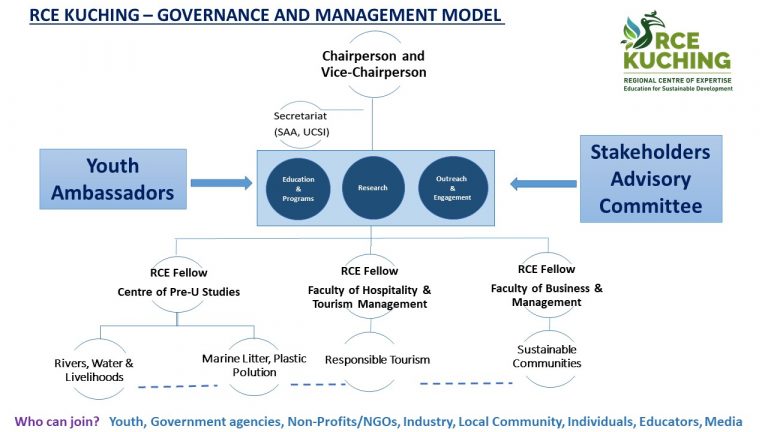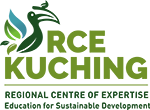Governance and Management Structure of RCE Kuching
The following explains the governance and management structure:

Governance and Management Model of RCE Kuching
The application committee meets every week to develop and revise the RCE application based on the review/feedback sent by the RCE mentor and RCE Peer (in this case, RCE Penang). The committee also discusses the various outreach and resource efforts to make the model successful. This committee will form part of the coordinating committee eventually when the RCE is fully acknowledged by UNU-IAS
Stakeholder Advisory Committee
This group consists of representatives from the collaborative partners of RCE Kuching. The committee will have the role as the advisory group for the RCE and will meet quarterly to offer their insights, including networking opportunities for working on projects and education programs within the region.
Coordinating Committee
This group has the role of being the secretariat of RCE Kuching, determining agendas for the coordinating and stakeholder meetings. The coordinating committee consists of the Secretariat hosted in UCSI Kuching campus, fulfilling its central administrative duties, maintaining records and performing secretarial duties. The committee will meet once a month to discuss the various programmes in terms of planning, implementation, monitoring and assessment. The committee will also coordinate stakeholder meetings quarterly. It will designate and oversee taskforces assigned to tasks based on feedback from the stakeholder advisory group. The Coordinating committee is now led by the RCE Chairperson, Assoc Prof Dr Yeong Siew Wei who is assisted by the vice-chairperson, Mukvinder Sandhu
4 Working Groups
The Working Groups aim to raise knowledge, awareness and action on the key related SDGs through Education for Sustainable Development (ESD) as the main framework in its educational programs, research development and outreach and engagement efforts.
This working group focuses on partnership with the community towards education for sustainable development, highlighting the current status of water and its related rivers ecosystem, in relation to freshwater and water use efficiency. The fact that 2.2 billion people around the world still lack safely managed drinking water calls for efforts to tackle the global water crisis. Growing populations and economic development have stressed industry and agriculture to demand more water. Alternative energy which is water-intensive has also been a cause of increased water demand. Climate change has also made water scarcer and erratic, not to mention the pollution that it is subjected to. Water has enormous value for people’s livelihoods including households, culture, health, education, economics, and the integrity of our natural environment.
A core focus of the working group is the support of the achievement of the Sustainable Development Goal (SDG) 6: water and sanitation for all by 2030. This WG aims to raise awareness on valuing water so we can safeguard this precious resource for all livelihoods.
It is a common thing to hear now that there will be more plastics in the oceans than fish by 2050. Plastics production has increased twentyfold since 1964, reaching 311 million tons in 2014. This is expected to further quadruple by 2050. It is currently estimated that the amount of plastics present in our oceans is 80 million tons. Only 5 % of plastics are recycled effectively, 40% end up in landfills and a third end up in fragile ecosystems such as the world’s oceans. Large plastic items are increasingly becoming a threat as marine life become entangled or hurt by them. Tiny plastic particles up to 5 mm in diameter, called microplastics have been shown to block digestive tracts and alter feeding behaviours of marine creatures. These microplastics have been detected in marine organisms and even drinking water and their direct impact on marine animals and humans is still being studied.
Consequently, the current linear economic model which focuses on the ‘take-make-dispose’ system has been increasingly challenged to shift to one that is circular by design – the Circular Economy. In this economic system, materials constantly flow around in a ‘closed loop’ without leaking into the environment, resulting in plastics being completely recycled and not lost or thrown away.
A core focus of the working group is the support of the achievement of the Sustainable Development Goals (SDGs) 12 and 14: life below water and responsible consumption and production by 2030. This WG aims to raise awareness on the effects of plastics pollution and the importance of advocating the Circular Economy and encourage action towards zero single use plastics.
Responsible Tourism refers to tourism which minimizes the negative social, economic, and environmental impacts of tourism and provides economic benefits to local communities, hence ensuring their well-being. Without a doubt the devastating effects of the Covid-19 pandemic on travel and tourism has shaken the industry to its very core. The new realities of tourism require that as we gear up to revive things and to address the ‘pent up demand or appetite’ of post pandemic tourists/holidaymakers. Naturally, questions and thoughts on sustainability in the tourism and hospitality industry will arise such as: “Can we reset tourism to be more responsible?”. It is truly now or never – that we are being given the chance to reopen tourism in a safe and responsible way.
A core focus of this working group is the support of the achievement of the Sustainable Development Goal (SDG) 15: life on land by 2030. The WG aims to raise awareness on responsible tourism amongst the practitioners and stakeholders of the tourism industry.
Rapid growth and development are often seen in a positive light as they are known to create opportunities but without a doubt, they have also brought unprecedented social, economic, and environmental challenges. Urban and rural communities around the world need to tackle these challenges and increase their resilience to these issues. Sustainable communities embody sustainability in almost every aspect and are places where people are safe and inclusive and live a high quality of life. They are sensitive to their environment and display a good balance and integration of the social, economic, and environmental components of their community.
A core focus of this working group is the support of the achievement of the Sustainable Development Goal (SDG) 11: sustainable cities and communities by 2030.
